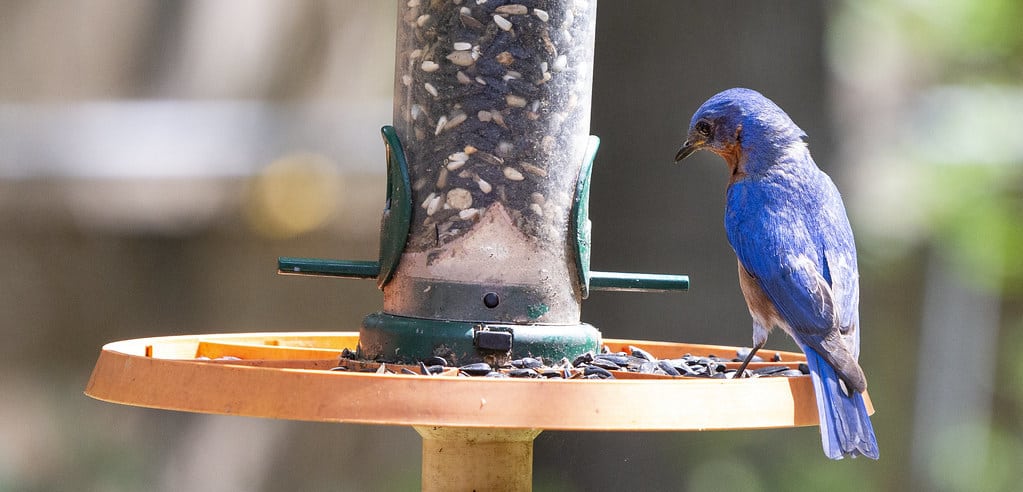
In almost 20 years of monitoring bluebird houses, I haven’t worried much about what bluebirds will or won’t eat. Bluebirds tend to fend for themselves pretty well and find their own food. But, during harsh winters when insects are scarce, it’s normal to start wondering how you can attract bluebirds to your feeders and which foods they will accept. So, in this article, I want to answer one of the most common questions about feeding bluebirds at feeders: do bluebirds eat sunflower seeds?
As a general rule, bluebirds do eat sunflower seeds, especially in the winter when insects are harder to find. They strongly prefer hulled sunflower seeds served in a platform-style or hanging feeder. Bluebirds won’t eat whole sunflower seeds, since they are not able to crack open the shells with their beaks.
Are Seeds Part of a Bluebird’s Natural Diet?
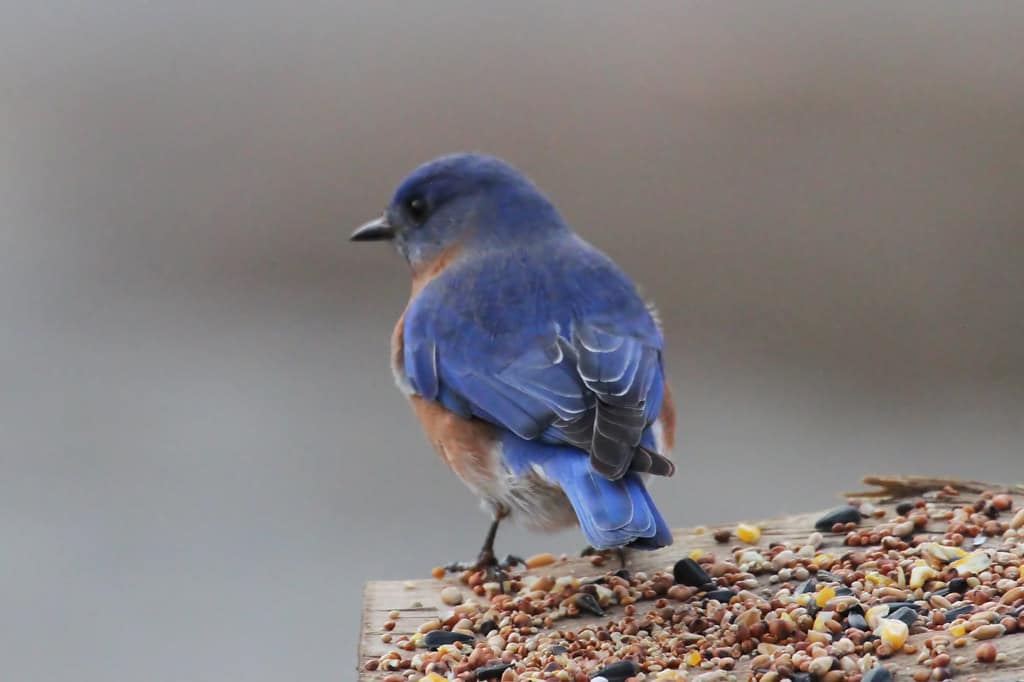
Photo by DrPhotoMoto, license: CC BY-ND 2.0
Bluebirds Mainly Eat Insects
Bluebirds are insectivores who mainly feed on insects and other bugs. According to one study, their diet consists of up to 68% insects (source). Their favorite things to eat during the summer breeding season, when they have babies to feed, seem to be caterpillars, grasshoppers, and spiders.
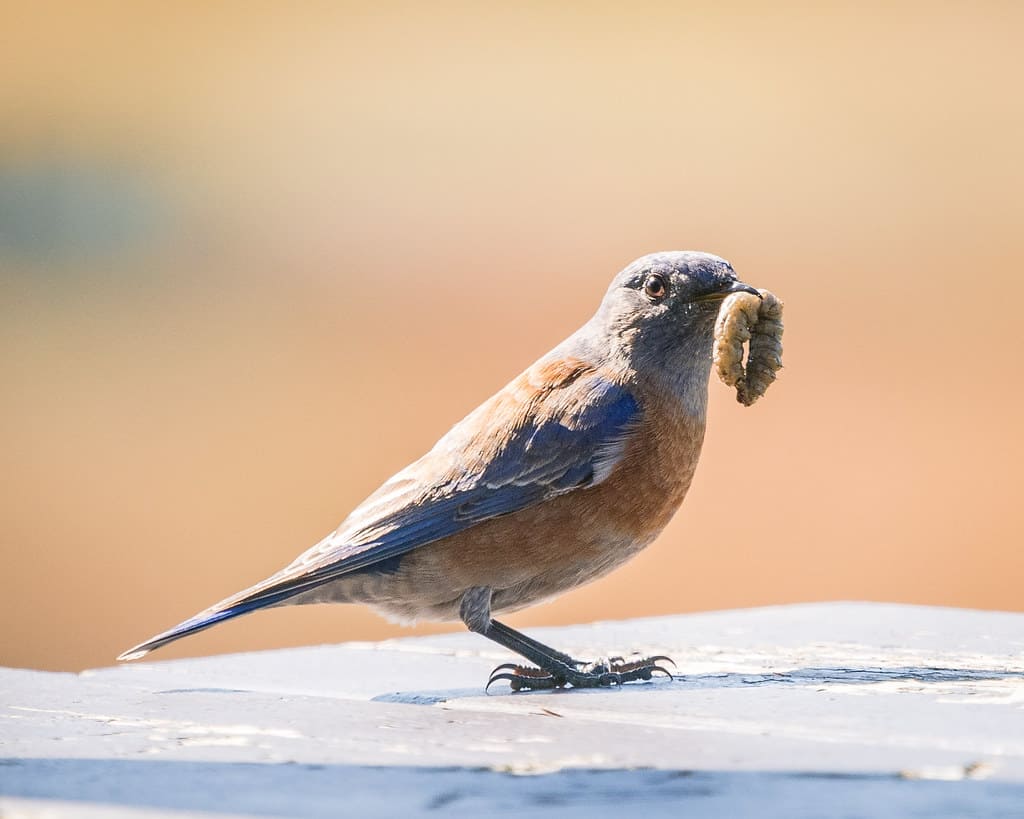
Photo by Becky Matsubara, license: CC BY 2.0
Bluebirds Eat Fruit In The Winter
In the wintertime, when the cold sets in and insects become harder to find, bluebirds turn to small fruits to make up for the lost calories. According to the Cornell Lab of Ornithology, bluebirds’ favorite fruits include “mistletoe, sumac, blueberries, black cherry, tupelo, currants, wild holly, dogwood berries, hackberries, honeysuckle, bay, pokeweed, and juniper berries” (source). They will also gladly eat bright red winterberries as shown in the photo below.
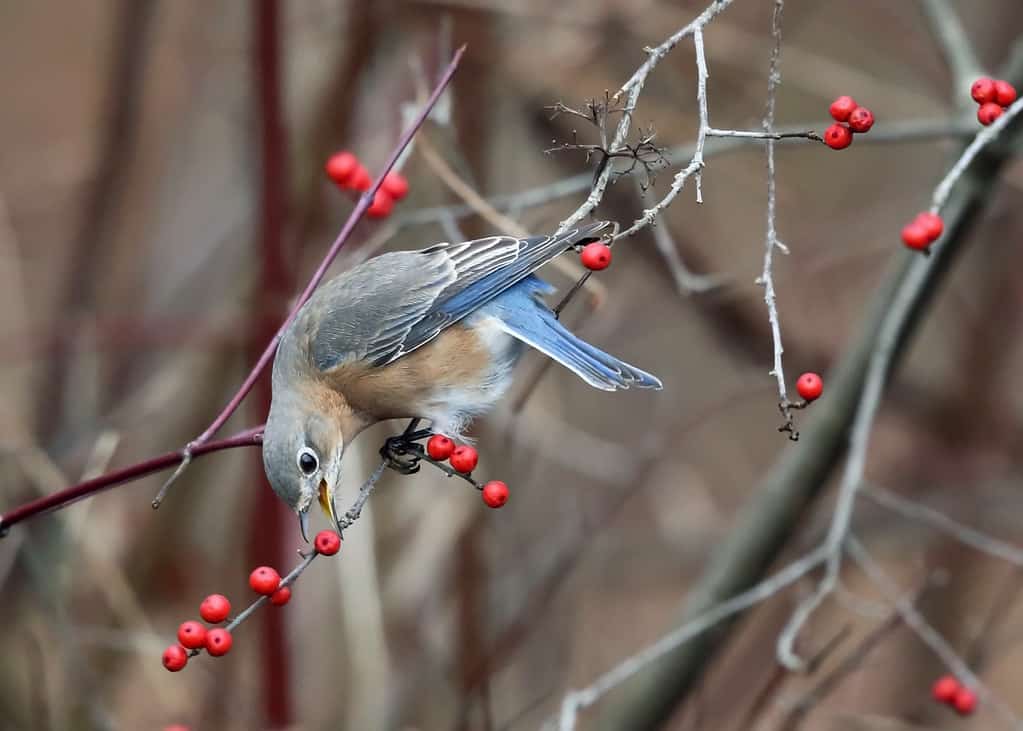
Photo by tcmurray74, license: CC BY-NC 2.0
Seeds Are Not Typical
Bluebirds, like many other animals, adapt their diet to their surroundings. Even though they’re adaptable, they don’t usually seek out seeds as a typical part of their diet.
While sunflower seeds don’t seem to be a part of the natural diet that bluebirds consume in the wild, bluebirds will sometimes eat sunflower seeds, safflower seeds, and chopped peanuts when they are offered by humans.
Even though bluebirds do eat sunflower seeds, there are certain types of sunflower seeds that bluebirds can’t eat.
Do Bluebirds Eat Sunflower Seeds In The Shell?
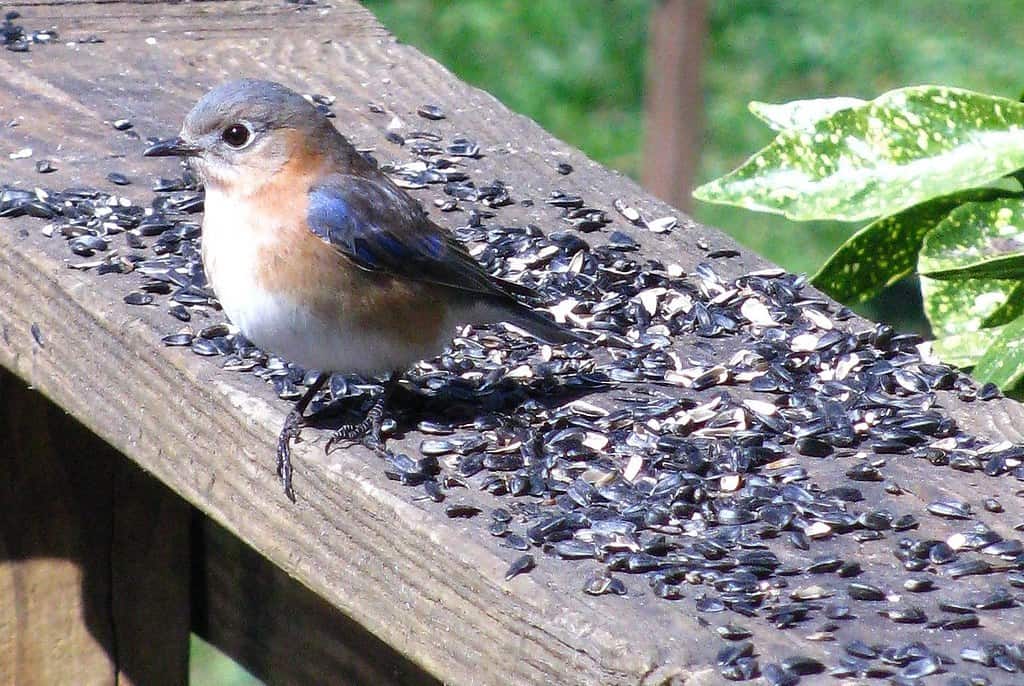
Photo by lymanzerga7285, license: CC BY-NC-ND 2.0
Bluebirds cannot eat sunflower seeds if they are left in the shell. Since their diet consists mainly of insects and soft fruits, their beaks simply are not designed for cracking through the hard exterior of the sunflower seed.
Consider the seed-eating beak of the cardinal and compare it to the insect-eating beak of the eastern bluebird in the two photos below.
The Northern Cardinal Has A Beak for Opening Seeds
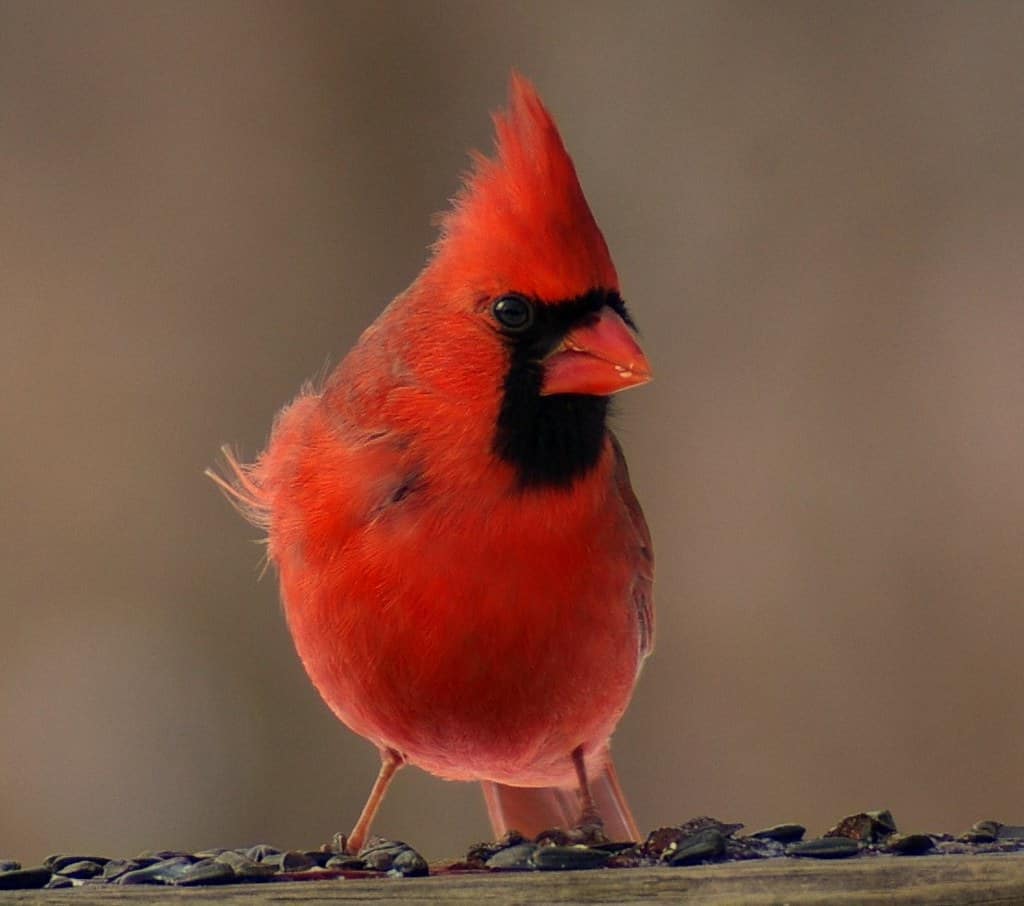
Photo: TheGreenHeron, license: CC BY-NC 2.0
This cardinal above has a beak that is capable of cracking the shells of sunflower seeds. It has no problem getting to the middle of the seed to devour the heart.
The Eastern Bluebird Has A Weaker Beak
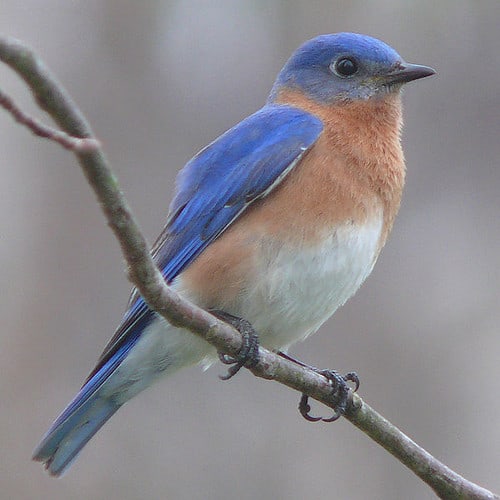
Photo by roberthuffstutter, license: CC BY 2.0
On the other hand, the eastern bluebird has a more delicate beak that is used for catching insects. It physically cannot crack a sunflower seed open to get to the middle. The same is true for western bluebirds and mountain bluebirds – they have weak beaks.
So, what kind of sunflower seeds do bluebirds actually eat?
Do Bluebirds Eat Hulled Sunflower Seeds?
Hulled sunflower seeds are the only type of sunflower seeds that bluebirds will eat. These are sometimes labelled as “shelled” sunflower seeds or sunflower seed “hearts.” Whatever you call them, once you remove the hard exterior shell from the sunflower seed, the seed becomes accessible and digestible for bluebirds.
You can see in the photo below that bluebirds will happily gobble up hulled sunflower seeds once they know where to find them.
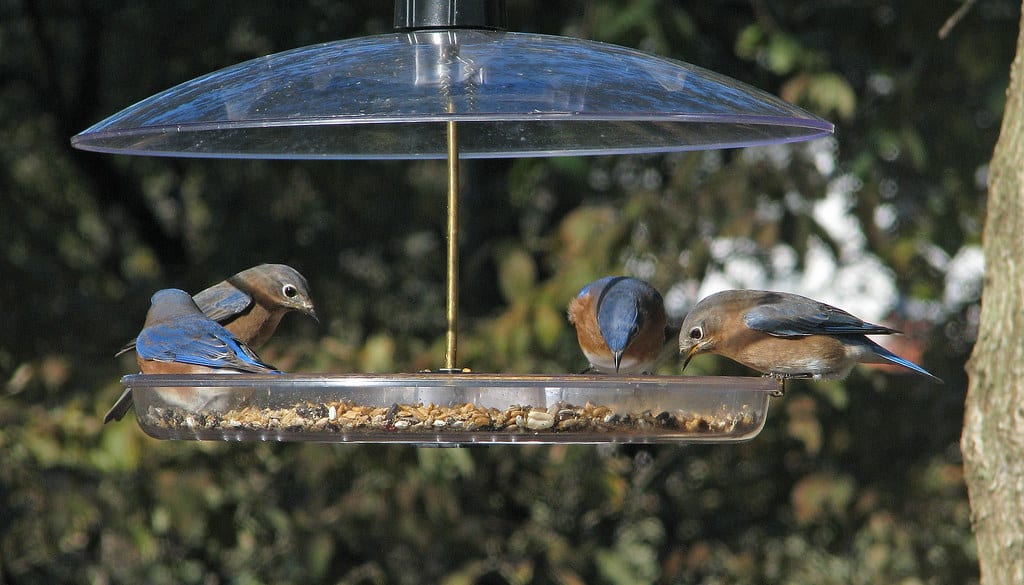
Photo by Vicki’s Nature, license: CC BY-NC-ND 2.0
Hulled sunflower seeds are what you should be offering at your feeder if you hope to attract bluebirds. (I’ll touch on bluebird feeding tips in just a minute.) But first, when are bluebirds most likely to forgo their usual diet of caterpillars and seek out sunflower seeds?
At What Time of Year Will Bluebirds Eat Sunflower Seeds?
Because insects are so readily available in the late spring and summer, you are most likely to see bluebirds eating sunflower seeds in the fall or winter when insects are scarce.
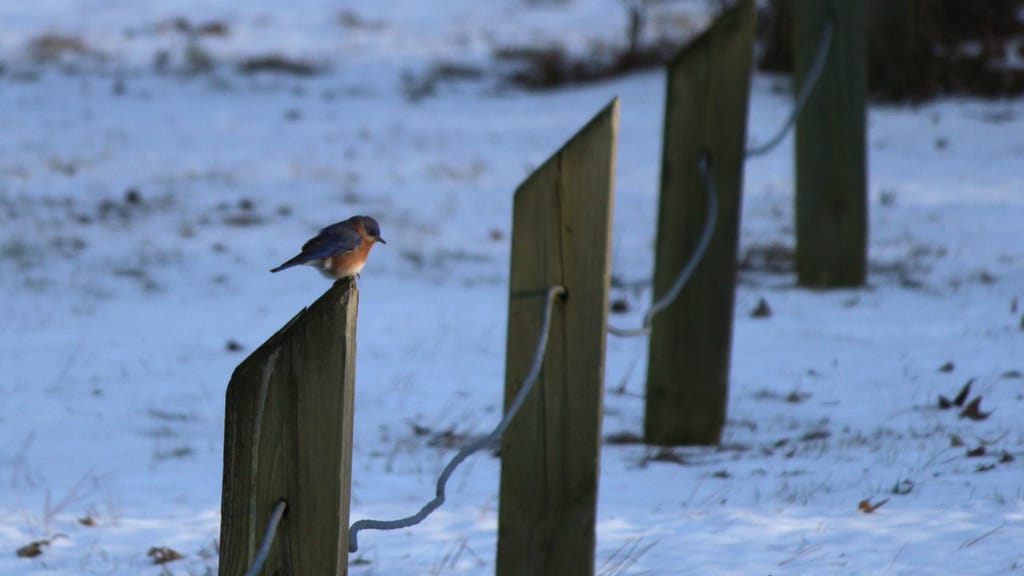
Photo by naturenutz4, license: CC BY-NC-SA 2.0
As I mentioned before, about 68% of a bluebirds diet is made up of insects. Bluebirds will keep catching insects for as long as they can find them, well into the late summer and early fall. When the temperatures drop and insects become harder to find, that’s when bluebirds will change up their diet and seek out fruit and other sources of energy, like seeds.
So, if you put out a feeder in the middle of summer and fill it with hulled sunflower seeds, don’t expect bluebirds to start flocking to it right away. Bluebirds will be preoccupied in the summer with all of the available caterpillars, spiders, and grasshoppers! Wait until the fall to start introducing sunflower seeds.
How to Feed Bluebirds Sunflower Seeds
Tip #1: Only feed “shelled” or “hulled” sunflower seeds
As I mentioned before, the best sunflower seeds for bluebirds are hulled or shelled seeds. If bluebirds have to crack through the shell to get to the seeds, the seeds will go uneaten. They just won’t be able to access the actual seed so they’ll turn to something else. When you’re looking for seeds at the store, look for anything that’s labelled as “shelled” or “hulled” sunflower “hearts,” “seeds” or “kernels.” And they can be “chipped,” “cracked,” or “whole” – as long as they’re out of the shell, they will be fine.
You can buy hulled sunflower seeds in bags at local stores that sell birdseed. But you can also buy sunflower seeds online in bulk to save some money. To check out the current bulk prices on Amazon, just click here.
Tip #2: Use the right type of feeder
There are two types of feeders that you can use to offer sunflower seeds to bluebirds: (1) platform feeders and (2) hanging bluebird feeders.
A Platform Feeder
A platform feeder offers an open plank (or platform) where you can feed birds any type of food that you want. These feeders are non-intimidating for most birds, and bluebirds will readily use them. (See a well-made platform feeder on Amazon here.) My dad actually built his own platform feeder and mounted it a foot off the ground near his bluebird house. The problem is that other birds can use the platform feeder too! If you choose this type of feeder, plenty of seed-eating birds will eventually discover it and bluebirds will have to move fast to get the seeds before anyone else does.
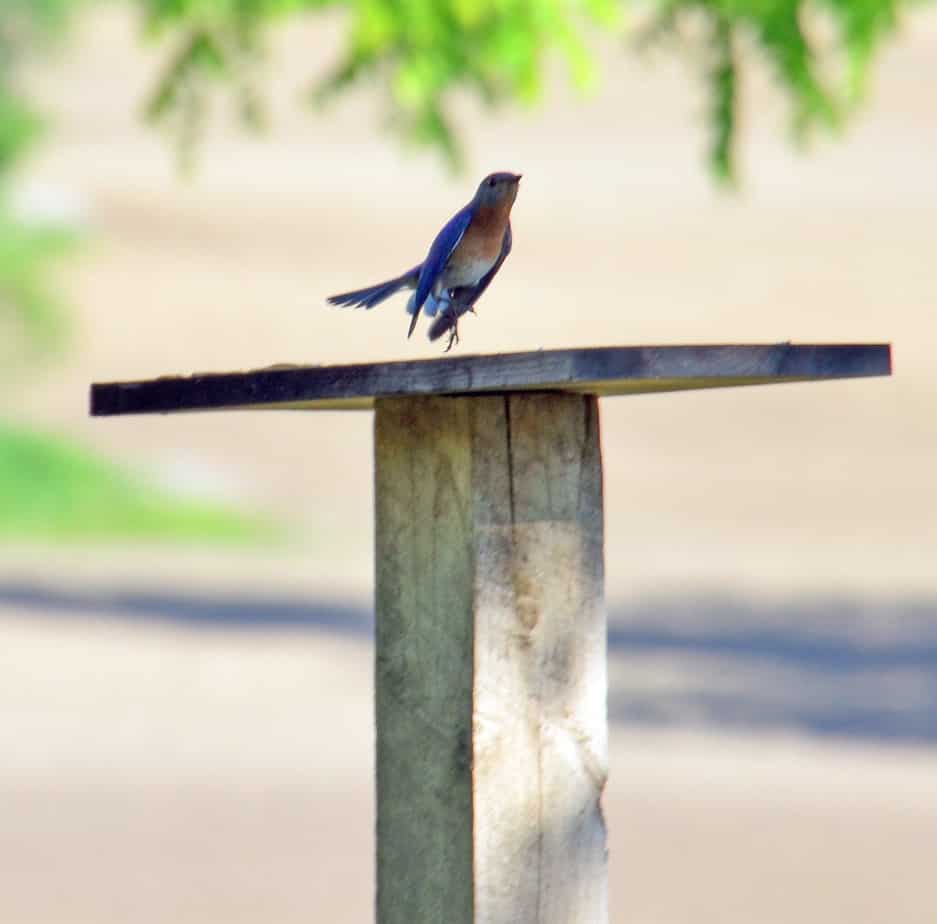
Photo by gerrybuckel, license: CC BY-ND 2.0
A Hanging Bluebird Feeder
Personally, I recommend using a hanging bluebird feeder instead of a platform feeder. Click here to find the exact one that I use on Amazon.
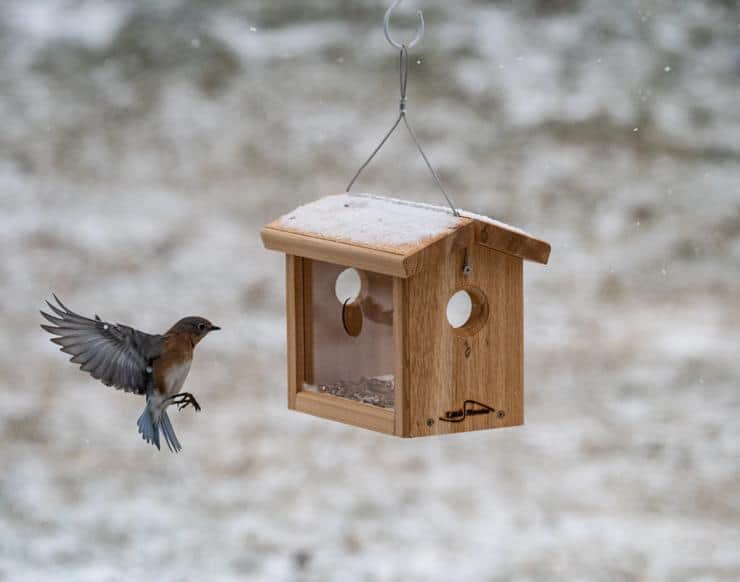
Photo by Kettle Moraine Woodworking
The advantage of a hanging feeder is that the entrance holes will keep out larger seed-eating birds. I don’t like to waste all of my sunflower seeds on other birds. Especially when I’m trying to attract bluebirds to a new feeder, sunflower seeds are precious. Once your bluebirds get the hang of the hanging feeder, they’ll continue returning to it for more sunflower seeds.
Conclusion
To conclude, bluebirds do eat sunflower seeds, as long as they are “hulled” and offered in an appropriate feeder, but you’re most likely to see this happen during the winter season as insects become increasingly scarce.
If you are trying to attract bluebirds to your backyard, consider learning more about feeding bluebirds. Click here for a helpful article from sialis.org on how to feed bluebirds.


